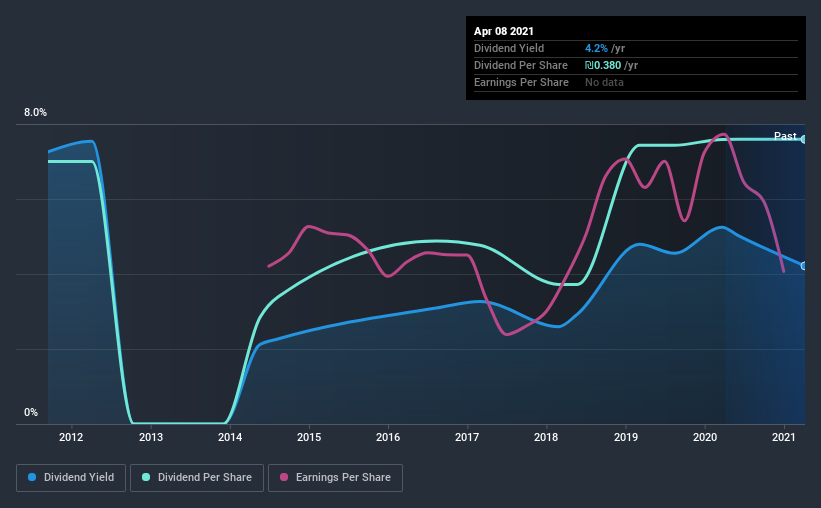Is Bank of Jerusalem Ltd. (TLV:JBNK) A Good Fit For Your Dividend Portfolio?

Could Bank of Jerusalem Ltd. (TLV:JBNK) be an attractive dividend share to own for the long haul? Investors are often drawn to strong companies with the idea of reinvesting the dividends. Unfortunately, it's common for investors to be enticed in by the seemingly attractive yield, and lose money when the company has to cut its dividend payments.
In this case, Bank of Jerusalem likely looks attractive to investors, given its 4.2% dividend yield and a payment history of over ten years. We'd guess that plenty of investors have purchased it for the income. There are a few simple ways to reduce the risks of buying Bank of Jerusalem for its dividend, and we'll go through these below.
Click the interactive chart for our full dividend analysis

Payout ratios
Companies (usually) pay dividends out of their earnings. If a company is paying more than it earns, the dividend might have to be cut. So we need to form a view on if a company's dividend is sustainable, relative to its net profit after tax. Bank of Jerusalem paid out 23% of its profit as dividends, over the trailing twelve month period. Given the low payout ratio, it is hard to envision the dividend coming under threat, barring a catastrophe.
We update our data on Bank of Jerusalem every 24 hours, so you can always get our latest analysis of its financial health, here.
Dividend Volatility
From the perspective of an income investor who wants to earn dividends for many years, there is not much point buying a stock if its dividend is regularly cut or is not reliable. Bank of Jerusalem has been paying dividends for a long time, but for the purpose of this analysis, we only examine the past 10 years of payments. Its dividend payments have declined on at least one occasion over the past 10 years. During the past 10-year period, the first annual payment was ₪0.3 in 2011, compared to ₪0.4 last year. Its dividends have grown at less than 1% per annum over this time frame.
We're glad to see the dividend has risen, but with a limited rate of growth and fluctuations in the payments, we don't think this is an attractive combination.
Dividend Growth Potential
With a relatively unstable dividend, it's even more important to see if earnings per share (EPS) are growing. Why take the risk of a dividend getting cut, unless there's a good chance of bigger dividends in future? While there may be fluctuations in the past , Bank of Jerusalem's earnings per share have basically not grown from where they were five years ago. Flat earnings per share are acceptable for a time, but over the long term, the purchasing power of the company's dividends could be eroded by inflation. Growth has been hard to come by. However, the payout ratio is low, and some companies can deliver adequate dividend performance simply by increasing the payout ratio.
Conclusion
When we look at a dividend stock, we need to form a judgement on whether the dividend will grow, if the company is able to maintain it in a wide range of economic circumstances, and if the dividend payout is sustainable. We're glad to see Bank of Jerusalem has a low payout ratio, as this suggests earnings are being reinvested in the business. Second, earnings have been essentially flat, and its history of dividend payments is chequered - having cut its dividend at least once in the past. In summary, we're unenthused by Bank of Jerusalem as a dividend stock. It's not that we think it is a bad company; it simply falls short of our criteria in some key areas.
Investors generally tend to favour companies with a consistent, stable dividend policy as opposed to those operating an irregular one. However, there are other things to consider for investors when analysing stock performance. For example, we've picked out 2 warning signs for Bank of Jerusalem that investors should know about before committing capital to this stock.
Looking for more high-yielding dividend ideas? Try our curated list of dividend stocks with a yield above 3%.
If you’re looking to trade Bank of Jerusalem, open an account with the lowest-cost* platform trusted by professionals, Interactive Brokers. Their clients from over 200 countries and territories trade stocks, options, futures, forex, bonds and funds worldwide from a single integrated account. Promoted
Valuation is complex, but we're here to simplify it.
Discover if Bank of Jerusalem might be undervalued or overvalued with our detailed analysis, featuring fair value estimates, potential risks, dividends, insider trades, and its financial condition.
Access Free AnalysisThis article by Simply Wall St is general in nature. It does not constitute a recommendation to buy or sell any stock, and does not take account of your objectives, or your financial situation. We aim to bring you long-term focused analysis driven by fundamental data. Note that our analysis may not factor in the latest price-sensitive company announcements or qualitative material. Simply Wall St has no position in any stocks mentioned.
*Interactive Brokers Rated Lowest Cost Broker by StockBrokers.com Annual Online Review 2020
Have feedback on this article? Concerned about the content? Get in touch with us directly. Alternatively, email editorial-team (at) simplywallst.com.
About TASE:JBNK
Proven track record with adequate balance sheet.
Market Insights
Community Narratives



